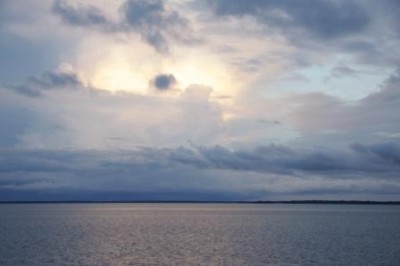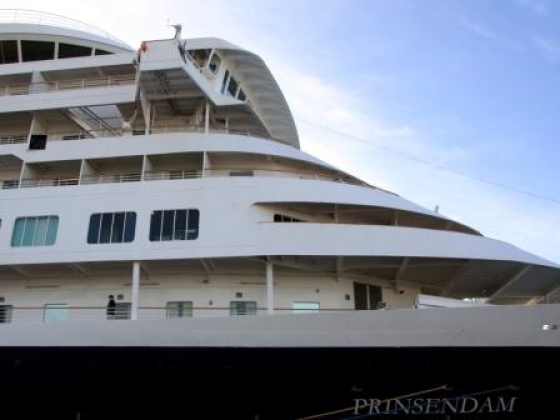De oceaan leek vandaag bijwijlen een spiegel. Het is een goddelijke heksentoer om een 2500m hoge (of diepe) watermassa zo egaal afgestreken te houden zoals die er vanmiddag bijlag – een verslagen furie. “Full speed” trokken we een scherpe lijn, langs de schouder van Brazilië, zoals een schaatser over zacht-glooiend natuurijs. Hoewel, zo simpel was het ook niet want, volgens de “Hoofdman of de Brug”, stond er wel een deining van twee meter, vanuit het zuidoosten. Eerder dan een schaatser droomde ik me zo een ruiter, op de brave schimmel van Sint Niklaas, die zich in gestrekte galop in een sinusoïdale lijn naar de onveranderende de horizon spoedde. Aangezien ik niet kan schaatsen noch paardrijden, zijn beide beelden ongelouterde fantasie.
Hoe dan ook, wij schuiven, met merkbare spoed en zonder tegenstand van het kobaltblauwe water, op naar de “ontzaglijke stranden” van Fortaleza, ooit tevens de prostitutie hoofdstad van Brazilië, waar we morgen om 8u aanmeren. Daartegen zullen de actrices, acteurs en andere geïnvertreerden wellicht al (of: nog?) in bed liggen.
Alvorens we morgen aan wal kunnen, moeten we vanavond nog het “Gala van de Chef Kok” verteren. Aldus worden we, voor de derde keer, verondersteld om ons minstens in donker-kostuum-met-plastron te paleren. Het is niet direct mijn favoriet tijdverdrijf, maar het heeft ook voordelen, vooral culinaire. Zo staat er dan op het menu duidelijk aangegeven welke kaas we als dessert kunnen krijgen, in plaats van alleen maar een “spectrum” of een “palette” van kazen. Daarenboven is er vanavond champagne.
Inderdaad, omdat Boudicca, koningin van de Kelten in Oost-Anglië, in 60AD de Romeinen, naar verluidt, beslissend heeft verslagen, drinken we vanavond aan onze tafel champagne. Boediwie, zeg je? In het kort gezegd is Boudicca vergelijkbaar met onze Ambiorix en Boduognat. Zoals de meeste Belgen zich ongetwijfeld herinneren danken we aan de wapenfeiten van laatstgenoemde Caesar’s uitspraak “omnium Gallorum Belgae fortisimmi sunt”. Deze drie “rebellenleiders” hebben iets gemeen: zij hebben het gepresteerd om op een ombewaakt moment een Romeins legioen te verslagen, waarna de Romeinen, telkens met veel inheems bloed, snel al de puntjes op de “i “gezet hebben.
Welnu, één van mijn tafelgenoten is een Amerikaanse dame die 30 jaar in het Amerikaans Leger heeft gediend – waarvoor ze ook militaire geschiedenis moest studeren. Welnu, in de (Engelse) “militaire geschiedenis” wordt Boudicca afgeschilderd als … een heldin, net zoals de Eburoonse held uit Tongeren. Geschiedenisboeken blijven welkome instrumenten in de handen van nationalisten. Enfin, het belangrijkste is dat we een reden hebben om champagne drinken; voor mij is het nu toch al van Nieuwjaar geleden! Ik hoop dat ik het me nog zal smaken, na al die Amazoonse vruchtensappen.
 Nog twee “faits divers” om af te sluiten. Ten eerste heb ik aan den lijve ondervonden dat we al meer dan zestien dagen onderweg zijn. Inderdaad, sinds gisteren doe ik enkel nog onderbroeken aan waar nummer 209 is opgenaaid. Dat is juist op tijd, want enkele uren geleden kwam de “piccolo van de was”, een vriendelijke jongen uitgedost in een blauwwit tenue met dito goudgerande piccolopots, mijn kleren doorzoeken wegens “een vergissing”. Ik kon alles bewijzen: 209 is vanaf nu van mij, en van niemand anders! Ten tweede, en ik heb dat eerder nooit vermeld, werd het houtsnijwerk dat in de Amazonië gekocht en aan boord gebracht werd, door “security” steevast aangeslagen! Na vier dagen kreeg je het terug … want dat was de tijd die de houten voorwerpen moesten doorbrengen in de diepvriezer om zeker te zijn dat de erin genestelde insecten, en hun eieren, vernietigd waren! Goed om weten!
Nog twee “faits divers” om af te sluiten. Ten eerste heb ik aan den lijve ondervonden dat we al meer dan zestien dagen onderweg zijn. Inderdaad, sinds gisteren doe ik enkel nog onderbroeken aan waar nummer 209 is opgenaaid. Dat is juist op tijd, want enkele uren geleden kwam de “piccolo van de was”, een vriendelijke jongen uitgedost in een blauwwit tenue met dito goudgerande piccolopots, mijn kleren doorzoeken wegens “een vergissing”. Ik kon alles bewijzen: 209 is vanaf nu van mij, en van niemand anders! Ten tweede, en ik heb dat eerder nooit vermeld, werd het houtsnijwerk dat in de Amazonië gekocht en aan boord gebracht werd, door “security” steevast aangeslagen! Na vier dagen kreeg je het terug … want dat was de tijd die de houten voorwerpen moesten doorbrengen in de diepvriezer om zeker te zijn dat de erin genestelde insecten, en hun eieren, vernietigd waren! Goed om weten!
Prinsendam, zondag 23 januari 2011
Pijlsnel zakkend langs de westelijke schouder van Brazilië

 While I had a chance to take a picture of all missing Amazonian jungle animals – in the Botanical Gardens from Belèm – and of a graceful and radiating church – the Igreja de la Santa Senhora de Nazaré – the landmark par excellence of this equatorial city is the market, named “Ver-o-Peso” (Check the Weight, an old Portuguese customs house). Today this market stretches along more than a mile of docks, measures in the neighborhood of 20 acres, and is covered by plastic roofs that resemble the tops of luxurious Arabian desert tents. Underneath the covers one finds a pasta of people and animals, and all kinds of raw, cooked or in between foodstuffs. On top of the roofs you find hundreds of fat vultures and, at a respectable distance, some hungry pigeons. Breughel would undoubtedly have loved to paint this late medieval scene.
While I had a chance to take a picture of all missing Amazonian jungle animals – in the Botanical Gardens from Belèm – and of a graceful and radiating church – the Igreja de la Santa Senhora de Nazaré – the landmark par excellence of this equatorial city is the market, named “Ver-o-Peso” (Check the Weight, an old Portuguese customs house). Today this market stretches along more than a mile of docks, measures in the neighborhood of 20 acres, and is covered by plastic roofs that resemble the tops of luxurious Arabian desert tents. Underneath the covers one finds a pasta of people and animals, and all kinds of raw, cooked or in between foodstuffs. On top of the roofs you find hundreds of fat vultures and, at a respectable distance, some hungry pigeons. Breughel would undoubtedly have loved to paint this late medieval scene.